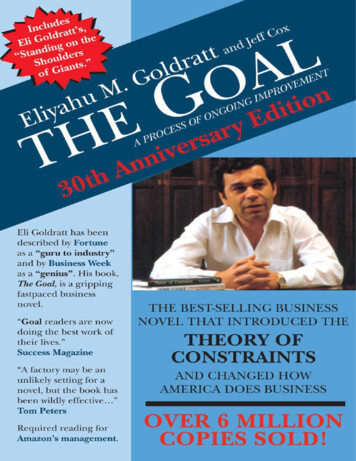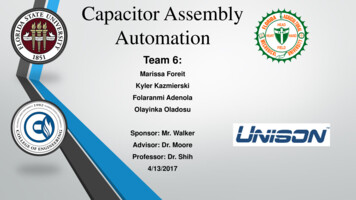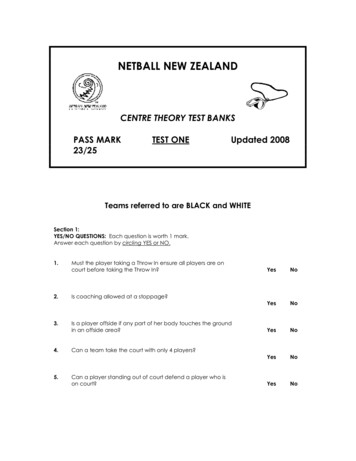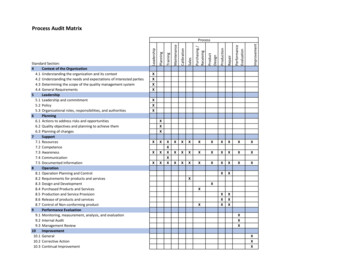
Transcription
Other North River Press Booksby Eliyahu M. GoldrattThe Race (with Robert E. Fox)Theory of ConstraintsThe Haystack SyndromeIt’s Not LuckCritical ChainNecessary But Not SuffcientProduction the TOC WayEssays on the Theory of ConstraintsLate Night DiscussionsThe Choice
Additional copies can be obtained from your localbookstore or the publisher:The North River Press Publishing CorporationP.O. Box 567Great Barrington, MA 01230(800) 486-2665 or (413) 528-0034www.northriverpress.com or more information regarding the ideaspresented in this book go towww.goldrattconsulting.comFirst Edition Copyright 1984 Eliyahu M. GoldrattRevised Edition Copyright 1986 Eliyahu M. GoldrattSecond revised Edition 1992 Eliyahu M. GoldrattThird Revised Edition 2004 Eliyahu M. GoldrattFourth Revised Edition 2014 Goldratt1, Ltd. (In memoryGoldratt. Words cannot describe our esteem and respect for his lifeworks.)of the author, the late Eliyahu M.Standing on the Shoulders of Giants 2008 Eliyahu M. GoldrattStanding on the Shoulders of Giants was written by Eliyahu M. Goldratt to mark the 25th anniversary ofpublishing The Goal. The article was origionally published in the December 2008 issue of Weekly Diamond,Japan.All rights reserved. No part of this book may be reproduced or utilized in any formor by any means, electronic or mechanical, including photocopying, recording, orany information storage retrieval system, without permission in writing from thepublisher.Manufactured in the United States of America
ISBN: 978-0-88426-274-8Library of Congress Cataloging-in-Publication DataGoldratt, Eliyahu M., 1948The goal: a process of ongoing improvementI. Cox, Jeff, 1951-. II. TitlePR9510.9.G64G61986 823 86-12566
Table of ContentsFront CoverHalf-Title PageTitle PageCopyright PageIntroductionIntroduction to the First EditionChapter 1Chapter 2Chapter 3Chapter 4Chapter 5Chapter 6Chapter 7Chapter 8Chapter 9Chapter 10Chapter 11Chapter 12Chapter 13Chapter 14Chapter 15
Chapter 16Chapter 17Chapter 18Chapter 19Chapter 20Chapter 21Chapter 22Chapter 23Chapter 24Chapter 25Chapter 26Chapter 27Chapter 28Chapter 29Chapter 30Chapter 31Chapter 32Chapter 33Chapter 34Chapter 35Chapter 36Chapter 37Chapter 39Chapter 39Chapter 40Standing on the Shoulders of GiantsFive Focusing StepsAbout the Author
Back Cover
INTRODUCTIONThe Goal is about science and education. I believe that these two words havebeen abused to the extent that their original meanings have been lost in a fog of toomuch respect and mystery. Science for me, and for the vast majority of respectablescientists, is not about the secrets of nature or even about truths. Science is simplythe method we use to try and postulate a minimum set of assumptions that canexplain, through a straightforward logical derivation, the existence of manyphenomena of nature.The Law of Conservation of Energy of physics is not truth. It is just anassumption that is valid in explaining a tremendous amount of natural phenomena.Such an assumption can never be proven since even an infinite number ofphenomena that can be explained by it does not prove its universal application. Onthe other hand, it can be disproved by just a single phenomenon that cannot beexplained by the assumption. This disproving does not detract from the validity ofthe assumption. It just highlights the need or even the existence of anotherassumption that is more valid. This is the case with the assumption of theconservation of energy which was replaced by Einstein’s more global—more valid—postulation of the conservation of energy and mass. Einstein’s assumption is nottrue to the same extent that the previous one was not “true.”Somehow we have restricted the connotation of science to a very selective,limited assemblage of natural phenomena. We refer to science when we deal withphysics, chemistry or biology. We should also realize that there are many morephenomena of nature that do not fall into these categories, for instance thosephenomena we see in organizations, particularly those in industrial organizations. Ifthese phenomena are not phenomena of nature, what are they? Do we want to placewhat we see in organizations to the arena of fiction rather than into reality?This book is an attempt to show that we can postulate a very small number ofassumptions and utilize them to explain a very large spectrum of industrialphenomena. You the reader can judge whether or not the logic of the book’sderivation from its assumptions to the phenomena we see daily in our plants is soflawless that you call it common sense. Incidentally, common sense is not socommon and is the highest praise we give to a chain of logical conclusions. If youdo, you basically have taken science from the ivory tower of academia and put itwhere it belongs, within the reach of every one of us and made it applicable to whatwe see around us.What I have attempted to show with this book is that no exceptional brain poweris needed to construct a new science or to expand on an existing one. What is needed
is just the courage to face inconsistencies and to avoid running away from them justbecause “that’s the way it was always done.” I dared to interweave into the book afamily life struggle, which I assume is quite familiar to any manager who is to someextent obsessed with his work. This was not done just to make the book morepopular, but to highlight the fact that we tend to disqualify many phenomena ofnature as irrelevent as far as science is concerned.I have also attempted to show in the book the meaning of education. I sincerelybelieve that the only way we can learn is through our deductive process. Presentingus with final conclusions is not a way that we learn. At best it is a way that we aretrained. That’s why I tried to deliver the message contained in the book in theSocratic way. Jonah, in spite of his knowledge of the solutions, provoked Alex toderive them by supplying the question marks instead of the exclamation marks. Ibelieve that because of this method, you the reader will deduce the answers wellbefore Alex Rogo succeeds in doing so. If you find the book entertaining maybeyou will agree with me that this is the way to educate, this is the way we shouldattempt to write our textbooks. Our textbooks should not present us with a series ofend results but rather a plot that enables the reader to go through the deductionprocess himself. If I succeed by this book to change somewhat your perception ofscience and education, this is my true reward.
INTRODUCTION TOTHE FIRST EDITION“The Goal” is about New global principles of manufacturing. It’s about peopletrying to understand what makes their world tick so that they can make it better. Asthey think logically and consistently about their problems they are able to determine“cause and effect” relationships between their actions and the results. In the processthey deduce some basic principles which they use to save their plant and make itsuccessful.I view science as nothing more than an understanding of the way the world isand why it is that way. At any given time our scientific knowledge is simply thecurrent state of the art of our understanding. I do not believe in absolute truths. I fearsuch beliefs because they block the search for better understanding. Whenever wethink we have final answers progress, science, and better understanding ceases.Understanding of our world is not something to be pursued for its own sake,however. Knowledge should be pursued, I believe, to make our world better—tomake life more fulfilling.There are several reasons I chose a novel to explain my understanding ofmanufacturing—how it works (reality) and why it works that way. First, I want tomake these principles more understandable and show how they can bring order tothe chaos that so often exists in our plants. Second, I wanted to illustrate the powerof this understanding and the benefits it can bring. The results achieved are notfantasy; they have been, and are being, achieved in real plants. The western worlddoes not have to become a second or third rate manufacturing power. If we justunderstand and apply the correct principles, we can compete with anyone. I alsohope that readers would see the validity and value of these principles in otherorganizations such as banks, hospitals, insurance companies and our families.Maybe the same potential for growth and improvement exists in all organizations.Finally, and most importantly, I wanted to show that we can all be outstandingscientists. The secret of being a good scientist, I believe, lies not in our brain power.We have enough. We simply need to look at reality and think logically and preciselyabout what we see. The key ingredient is to have the courage to face inconsistenciesbetween what we see and deduce and the way things are done. This challenging ofbasic assumptions is essential to breakthroughs. Almost everyone who has workedin a plant is at least uneasy about the use of cost accounting efficiencies to controlour actions. Yet few have challenged this sacred cow directly. Progress inunderstanding requires that we challenge basic assumptions about how the world is
and why it is that way. If we can better understand our world and the principles thatgovern it, I suspect all our lives will be better.Good luck in your search for these principles and for your own understandingof “The Goal.”
1I come through the gate this morning at 7:30 and I can see it from across the lot:the crimson Mercedes. It’s parked beside the plant, next to the offices. And it’s in myspace. Who else would do that except Bill Peach? Never mind that the whole lot ispractically empty at that hour. Never mind that there are spaces marked “Visitor.”No, Bill’s got to park in the space with my title on it. Bill likes to make subtlestatements. So, okay, he’s the division vice-president, and I’m just a mere plantmanager. I guess he can park his damn Mercedes wherever he wants.I put my Mazda next to it (in the space marked “Controller”). A glance at thelicense as I walk around it assures me it has to be Bill’s car because the plate says“NUMBER 1.” And, as we all know, that’s absolutely correct in terms of who Billalways looks out for. He wants his shot at CEO. But so do I. Too bad that I maynever get the chance now.Anyway, I’m walking up to the office doors. Already the adrenalin is pumping.I’m wondering what the hell Bill is doing here. I’ve lost any hope of getting anywork done this morning. I usually go in early to catch up on all the stuff I’m toobusy to do during the day, because I can really get a lot done before the phone ringsand the meetings start, before the fires break out. But not today.“Mr. Rogo!” I hear someone calling.I stop as four people come bursting out of a door on the side of the plant. I seeDempsey, the shift supervisor; Martinez, the union steward; some hourly guy; and amachining center foreman named Ray. And they’re all talking at the same time.Dempsey is telling me we’ve got a problem. Martinez is shouting about how there isgoing to be a walkout. The hourly guy is saying something about harassment. Ray isyelling that we can’t finish some damn thing because we don’t have all the parts.Suddenly I’m in the middle of all this. I’m looking at them; they’re looking at me.And I haven’t even had a cup of coffee yet.When I finally get everyone calmed down enough to ask what’s going on, I learnthat Mr. Peach arrived about an hour before, walked into my plant, and demanded tobe shown the status of Customer Order Number 41427.
Well, as fate would have it, nobody happened to know about Customer Order41427. So Peach had everybody stepping and fetching to chase down the story on it.And it turns out to be a fairly big order. Also a late one. So what else is new?Everything in this plant is late. Based on observation, I’d say this plant has fourranks of priority for orders: Hot Very Hot Red Hot and Do It NOW! Wejust can’t keep ahead of anything.As soon as he discovers 41427 is nowhere close to being shipped, Peach startsplaying expeditor. He’s storming around, yelling orders at Dempsey. Finally it’sdetermined almost all the parts needed are ready and waiting—stacks of them. Butthey can’t be assembled. One part of some sub-assembly is missing; it still has to berun through some other operation yet. If the guys don’t have the part, they can’tassemble, and if they can’t assemble, naturally, they can’t ship.They find out the pieces for the missing subassembly are sitting over by one ofthe n/c machines, where they’re waiting their turn to be run. But when they go to thatdepartment, they find the machinists are not setting up to run the part in question, butinstead some other do-it-now job which somebody imposed upon them for someother product.Peach doesn’t give a damn about the other do-it-now job. All he cares about isgetting 41427 out the door. So he tells Dempsey to direct his foreman, Ray, toinstruct his master machinist to forget about the other super-hot gizmo and getready to run the missing part for 41427. Whereupon the master machinist looksfrom Ray to Dempsey to Peach, throws down his wrench, and tells them they’re allcrazy. It just took him and his helper an hour and a half to set up for the other partthat everyone needed so desperately. Now they want to forget about it and set up forsomething else instead? The hell with it! So Peach, always the diplomat, walks pastmy supervisor and my foreman, and tells the master machinist that if he doesn’t dowhat he’s told, he’s fired. More words are exchanged. The machinist threatens towalk off the job. The union steward shows up. Everybody is mad. Nobody isworking. And now I’ve got four upset people greeting me bright and early in frontof an idle plant.“So where is Bill Peach now?” I ask.“He’s in your office,” says Dempsey.“Okay, would you go tell him I’ll be in to talk to him in a minute,” I ask.Dempsey gratefully hurries toward the office doors. I turn to Martinez and thehourly guy, who I discover is the machinist. I tell them that as far as I’m concernedthere aren’t going to be any firings or suspensions—that the whole thing is just amisunderstanding. Martinez isn’t entirely satisfied with that at first, and themachinist sounds as if he wants an apology from Peach. I’m not about to step into
that one. I also happen to know that Martinez can’t call a walkout on his ownauthority. So I say if the union wants to file a grievance, okay; I’ll be glad to talk tothe local president, Mike O’Donnell, later today, and we’ll handle everything in duecourse. Realizing he can’t do anything more before talking to O’Donnell anyway,Martinez finally accepts that, and he and the hourly guy start walking back to theplant.“So let’s get them back to work,” I tell Ray.“Sure, but uh, what should we be working on?” asks Ray. “The job we’re set upto run or the one Peach wants?”“Do the one Peach wants,” I tell him.“Okay, but we’ll be wasting a set-up,” says Ray.“So we waste it!” I tell him. “Ray, I don’t even know what the situation is. But forBill to be here, there must be some kind of emergency. Doesn’t that seem logical?”“Yeah, sure,” says Ray. “Hey, I just want to know what to do.”“Okay, I know you were just caught in the middle of all this,” I say to try tomake him feel better. “Let’s just get that setup done as quick as we can and startrunning that part.”“Right,” he says.Inside, Dempsey passes me on his way back to the plant. He’s just come from myoffice and he looks like he’s in a hurry to get out of there. He shakes his head at me.“Good luck,” he says out of the corner of his mouth.The door to my office is wide open. I walk in, and there he is. Bill Peach issitting behind my desk. He’s a stocky, barrel-chested guy with thick, steely-gray hairand eyes that almost match. As I put my briefcase down, the eyes are locked onto mewith a look that says This is your neck, Rogo.“Okay, Bill, what’s going on?” I ask.He says, “We’ve got things to talk about. Sit down.”I say, “I’d like to, but you’re in my seat.”It may have been the wrong thing to say.“You want to know why I’m here?” he says. “I’m here to save your lousy skin.”I tell him, “Judging from the reception I just got, I’d say you’re here to ruin mylabor relations.”He looks straight at me and says, “If you can’t make some things happen aroundhere, you’re not going to have any labor to worry about. Because you’re not goingto have this plant to worry about. In fact, you may not have a job to worry about,Rogo.”
“Okay, wait a minute, take it easy,” I say. “Let’s just talk about it. What’s theproblem with this order?”First of all, Bill tells me that he got a phone call last night at home around teno’clock from good old Bucky Burnside, president of one of UniCo’s biggestcustomers. Seems that Bucky was having a fit over the fact that this order of his(41427) is seven weeks late. He proceeded to rake Peach over the coals for about anhour. Bucky apparently had gone out on a limb to sway the order over to us wheneverybody was telling him to give the business to one of our competitors. He hadjust had dinner with several of his customers, and they had dumped all over himbecause their orders were late—which, as it happens, was because of us. So Buckywas mad (and probably a little drunk). Peach was able to pacify him only bypromising to deal with the matter personally and by guaranteeing that the orderwould be shipped by the end of today, no matter what mountains had to be moved.I try to tell Bill that, yes, we were clearly wrong to have let this order slide, andI’ll give it my personal attention, but did he have to come in here this morning anddisrupt my whole plant?So where was I last night, he asks, when he tried to call me at home? Under thecircumstances, I can’t tell him I have a personal life. I can’t tell him that the first twotimes the phone rang, I let it ring because I was in the middle of a fight with mywife, which, oddly enough, was about how little attention I’ve been giving her. Andthe third time, I didn’t answer it because we were making up.I decide to tell Peach I was just late getting home. He doesn’t press the issue.Instead, he asks how come I don’t know what’s going on inside my own plant. He’ssick and tired of hearing complaints about late shipments. Why can’t I stay on top ofthings?“One thing I do know,” I tell him, “is that after the second round of layoffs youforced on us three months ago, along with the order for a twenty percent cutback,we’re lucky to get anything out the door on time.”“Al,” he says quietly, “just build the damn products. You hear me?”“Then give me the people I need!” I tell him.“You’ve got enough people! Look at your efficiencies, for god’s sake! You’vegot room for improvement, Al,” he says. “Don’t come crying to me about notenough people until you show me you can effectively use what you’ve got.”I’m about to say something when Peach holds up his hand for me to shut mymouth. He stands up and goes over to close the door. Oh shit, I’m thinking.He turns by the door and tells me, “Sit down.”I’ve been standing all this time. I take a seat in one of the chairs in front of the
desk, where a visitor would sit. Peach returns behind the desk.“Look, Al, it’s a waste of time to argue about this. Your last operations reporttells the story,” says Peach.I say, “Okay, you’re right. The issue is getting Burnside’s order shipped—”Peach explodes. “Dammit, the issue is not Burnside’s order! Burnside’s order isjust a symptom of the problem around here. Do you think I’d come down here justto expedite a late order? Do you think I don’t have enough to do? I came down hereto light a fire under you and everybody else in this plant. This isn’t just a matter ofcustomer service. Your plant is losing money.”He pauses for a moment, as if he had to let that sink in. Then—bam—he poundshis fist on the desk top and points his finger at me.“And if you can’t get the orders out the door,” he continues, “then I’ll show youhow to do it. And if you still can’t do it, then I’ve got no use for you or this plant.”“Now wait a minute, Bill—”“Dammit, I don’t have a minute!” he roars. “I don’t have time for excusesanymore. And I don’t need explanations. I need performance. I need shipments. Ineed income!”“Yes, I know that, Bill.”“What you may not know is that this division is facing the worst losses in itshistory. We’re falling into a hole so deep we may never get out, and your plant is theanchor pulling us in.”I feel exhausted already. Tiredly I ask him, “Okay, what do you want from me?I’ve been here six months. I admit it’s gotten worse instead of better since I’ve beenhere. But I’m doing the best I can.”“If you want the bottom line, Al, this is it: You’ve got three months to turn thisplant around,” Peach says.“And suppose it can’t be done in that time?” I ask.“Then I’m going to go to the management committee with a recommendation toclose the plant,” he says.I sit there speechless. This is definitely worse than anything I expected to hearthis morning. And, yet, it’s not really that surprising. I glance out the window. Theparking lot is filling with the cars of the people coming to work first shift. When Ilook back, Peach has stood up and is coming around the desk. He sits down in thechair next to me and leans forward. Now comes the reassurance, the pep talk.“Al, I know that the situation you inherited here wasn’t the best. I gave you thisjob because I thought you were the one who could change this plant from a loser to well, a small winner at least. And I still think that. But if you want to go places in
this company, you’ve got to deliver results.”“But I need time, Bill.”“Sorry, you’ve got three months. And if things get much worse, I may not evenbe able to give you that.”I sit there as Bill glances at his watch and stands up, discussion ended.He says, “If I leave now, I’ll only miss my first meeting.”I stand up. He walks to the door.Hand on the knob, he turns and says with a grin, “Now that I’ve helped you kicksome ass around here, you won’t have any trouble getting Bucky’s order shippedfor me today, will you?”“We’ll ship it, Bill,” I say.“Good,” he says with wink as he opens the door.A minute later, I watch from the window as he gets into his Mercedes and drivestoward the gate.Three months. That’s all I can think about.I don’t remember turning away from the window. I don’t know how much timehas passed. All of a sudden, I’m aware that I’m sitting at my desk and I’m staringinto space. I decide I’d better go see for myself what’s happening out in the plant.From the shelf by the door, I get my hard hat and safety glasses and head out. I passmy secretary.“Fran, I’ll be out on the floor for a little while,” I tell her as I go by.Fran looks up from a letter she’s typing and smiles.“Okey-dokey,” she says. “By the way, was that Peach’s car I saw in your spacethis morning?”“Yes, it was.”“Nice car,” she says and she laughs. “I thought it might be yours when I first sawit.”Then I laugh. She leans forward across the desk.“Say, how much would a car like that cost?” she asks.“I don’t know exactly, but I think it’s around sixty thousand dollars,” I tell her.Fran catches her breath. “You’re kidding me! That much? I had no idea a carcould cost that much. Wow. Guess I won’t be trading in my Chevette on one of thosevery soon.”She laughs and turns back to her typing.Fran is an “okey-dokey” lady. How old is she? Early forties I’d guess, with two
teen-aged kids she’s trying to support. Her ex-husband is an alcoholic. They gotdivorced a long time ago since then, she’s wanted nothing to do with a man. Well,almost nothing. Fran told me all this herself on my second day at the plant. I like her.I like her work, too. We pay her a good wage at least we do now. Anyway, she’sstill got three months.Going into the plant is like entering a place where satans and angels havemarried to make kind of a gray magic. That’s what it always feels like to me. Allaround are things that are mundane and miraculous. I’ve always foundmanufacturing plants to be fascinating places—even on just a visual level. But mostpeople don’t see them the way I do.Past a set of double doors separating the office from the plant, the worldchanges. Overhead is a grid of lamps suspended from the roof trusses, andeverything is cast in the warm, orange hues of sodium-iodine light. There is a hugechain-link cage which has row after row of floor-to-roof racks loaded with bins andcartons filled with parts and materials for everything we make. In a skinny aislebetween two racks rides a man in the basket of a forklift crane that runs along atrack on the ceiling. Out on the floor, a reel of shiny steel slowly unrolls into themachine that every few seconds says “Ca-chunk.”Machines. The plant is really just one vast room, acres of space, filled withmachines. They are organized in blocks and the blocks are separated by aisles. Mostof the machines are painted in solid Mardi Gras colors—orange, purple, yellow,blue. From some of the newer machines, ruby numbers shine from digital displays.Robotic arms perform programs of mechanical dance.Here and there, often almost hidden among the machines, are the people. Theylook over as I walk by. Some of them wave; I wave back. An electric cart whinespast, an enormous fat guy driving it. Women at long tables work with rainbows ofwire. A grimy guy in amorphous coveralls adjusts his face mask and ignites awelding torch. Behind glass, a buxom, red-haired woman pecks the keys on acomputer terminal with an amber display.Mixed with the sights is the noise, a din with a continuous underlying chordmade by the whirr of fans, motors, the air in the ventilators—it all sounds like anendless breath. At random comes a BOOM of something inexplicable. Behind mering the alarm bells of an overhead crane rumbling up its track. Relays click. Thesiren sounds. From the P.A. system, a disembodied voice talks like God,intermittently and incomprehensibly, over everything.Even with all that noise, I hear the whistle. Turning, I see the unmistakable shapeof Bob Donovan walking up the aisle. He’s some distance away. Bob is what youmight call a mountain of a man, standing as he does at six-foot-four. He weighs in at
about 250 pounds, a hefty portion of which is beer gut. He isn’t the prettiest guy inthe world I think his barber was trained by the Marines. And he doesn’t talk realfancy; I suspect it’s a point of pride with him. But despite a few rough edges, whichhe guards closely, Bob is a good guy. He’s been production manager here for nineyears. If you need something to happen, all you do is talk to Bob and if it can bedone, it will be by the next time you mention it.It takes a minute or so for us to reach each other. As we get closer, I can see heisn’t very cheerful. I suppose it’s mutual.“Good morning,” says Bob.“I’m not sure what’s good about it,” I say. “Did you hear about our visitor?”“Yeah, it’s all over the plant,” says Bob.“So I guess you know about the urgency for shipping a certain order number41427?” I ask him.He starts to turn red. “That’s what I need to talk to you about.”“Why? What’s up?”“I don’t know if word reached you yet, but Tony, that master machinist Peachyelled at, quit this morning,” says Bob.“Aw, shit,” I mutter.“I don’t think I have to tell you that guys like that are not a dime a dozen. We’regoing to have a tough time finding a replacement,” says Bob.“Can we get him back?”“Well, we may not want him back,” says Bob. “Before he quit, he did the set-upthat Ray told him to do, and put the machine on automatic to do its run. The thing is,he didn’t tighten two of the adjusting nuts. We got little bits of machine tool all overthe floor now.”“How many parts do we have to scrap?”“Well, not that many. It only ran for a little while.”“Will we have enough to fill that order?” I ask him.“I’ll have to check,” he says. “But, see, the problem is that the machine itself isdown and it may stay down for some time.”“Which one is it?” I ask.“The NCX-10,” he says.I shut my eyes. It’s like a cold hand just reached inside me and grabbed thebottom of my stomach. That machine is the only one of its type in the plant. I askBob how bad the damage is. He says, “I don’t know. They’ve got the thing half tornapart out there. We’re on the phone with the manufacturer right now.”
I start walking fast. I want to see it for myself. God, are we in trouble. I glanceover at Bob, who is keeping pace with me.“Do you think it was sabotage?” I ask.Bob seems surprised. “Well, I can’t say. I think the guy was just so upset hecouldn’t think straight. So he screwed it up.”I can feel my face getting hot. The cold hand is gone. Now I’m so pissed off atBill Peach that I’m fantasizing about calling him on the phone and screaming in hisear. It’s his fault! And in my head I see him. I see him behind my desk and hear himtelling me how he’s going to show me how to get the orders out the door. Right,Bill. You really showed me how to do it.
2Isn’t it strange to feel your own world is falling apart while those of the peopleclose to you are rock steady? And you can’t figure out why they’re not affected theway you are. About 6:30, I slip away from the plant to run home and grab somedinner. As I come through the door, Julie looks up from the television.“Hi,” she says. “Like my hair?”She turns her head. The thick, straight brown hair she used to have is now a massof frizzed ringlets. And it isn’t all the same color anymore. It’s lighter in places.“Yeah, looks great,” I say automatically.“The hairdresser said it sets off my eyes,” she says, batting her long lashes atme. She has big, pretty blue eyes; they don’t need to be “set off” in my opinion, butwhat do I know?“Nice,” I say.“Gee, you’re not very enthusiastic,” she says.“Sorry, but I’ve had a rough day.”“Ah, poor baby,” she says. “But I’ve got a great idea! We’ll go out to dinner andyou can forget all about it.”I shake my head. “I can’t. I’ve got to
ISBN: 978-0-88426-274-8 Library of Congress Cataloging-in-Publication Data Goldratt, Eliyahu M., 1948-The goal: a process of ongoing improvement











